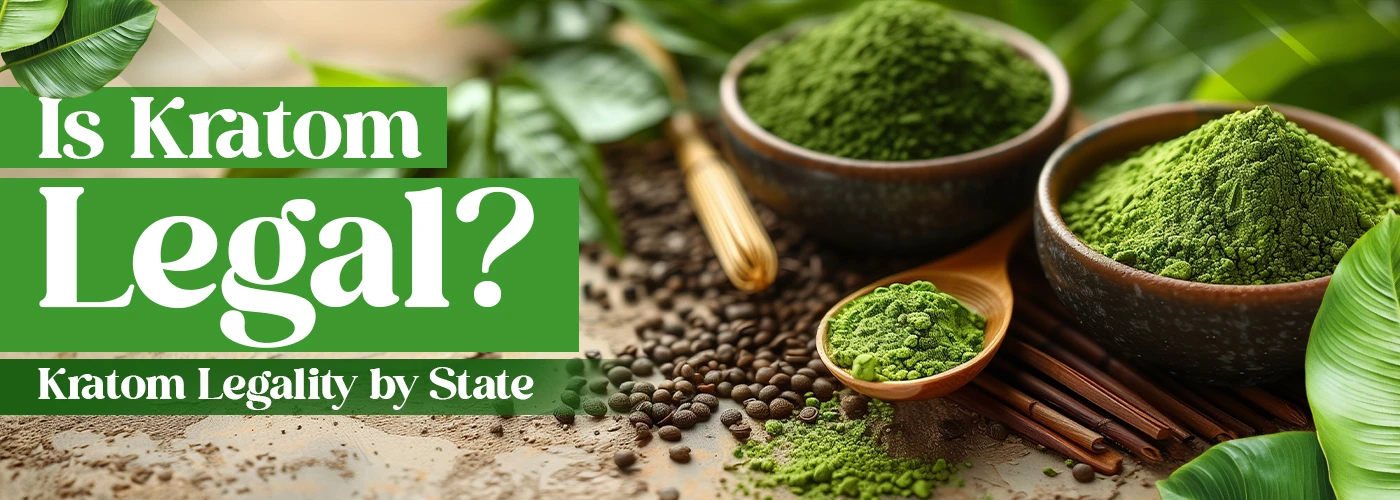Kratom is a plant that many people use for energy, focus, or relaxation. However, its legal status is not the same across the U.S. Some states ban it, others regulate it, and many allow it without rules. Before you buy or use kratom, it’s important to understand the law in your state. As research continues and lawmakers adopt new regulations, kratom’s legal landscape in 2025 is still evolving. This guide gives you a clear, state-by-state overview.
What is Kratom?
Kratom (Mitragyna speciosa) is a plant native to Southeast Asia known for its mood-enhancing and stimulating properties. In the U.S., it’s commonly sold as powder, capsules, extracts, and teas. Many users report benefits like increased focus or calm, though effects vary by dose and strain.
Federal Status and Regulation
Kratom is legal under federal law and is not classified as a controlled substance. However, the FDA does not regulate kratom as food or dietary supplements. This means there are no nationwide standards for testing, labeling, or product quality. Some vendors provide safe, lab-tested products, while others may not. As a result, states and even counties set their own rules.
States Where Kratom Is Banned
These states ban kratom:
- Alabama
- Arkansas
- Indiana
- Vermont
- Wisconsin
- Louisiana
- Rhode Island
In these states, kratom is treated as a drug. If you sell or have it, you face fines or jail.
Louisiana made kratom illegal on August 1, 2025. Lawmakers placed kratom on the list of controlled drugs. Learn more in Is kratom legal in Louisiana.
Indiana also bans kratom. The state has kept it illegal for many years. See Is kratom legal in Indiana.
States That Reversed Bans
Kratom is currently banned in Rhode Island. However, in July 2025, the state passed the Kratom Consumer Protection Act, which lifts the ban and establishes regulations. The law will take effect in April 2026, making Rhode Island the first state to transition from a ban to regulation.
States With Kratom Consumer Protection Acts
A Kratom Consumer Protection Act is called a KCPA. These laws say how kratom must be tested and sold. They set age limits. They require clear labels.
States with KCPAs now are:
- Utah
- Georgia
- Arizona
- Nevada
- Oregon
- Colorado
- Oklahoma
- West Virginia
- Virginia
- Florida
- Kentucky
- Maryland
- Texas
- South Dakota
- South Carolina
- Nebraska
Colorado sets the age at 21. The state also bans kratom in candy or vape form. More in Is kratom legal in Colorado.
Florida also sets the age at 21. It has strict rules for labeling and testing. Read Is kratom legal in Florida.
Georgia has a KCPA in place. See Is kratom legal in Georgia.
Texas passed a KCPA in 2023. Enforcement expanded in 2025. Learn more in Is kratom legal in Texas.
What Is the KCPA?
The Kratom Consumer Protection Act is a law passed in several states to regulate kratom products. It typically includes provisions like:
- Minimum age for purchase (18 or 21+)
- Product testing for contaminants
- Labeling requirements for alkaloid content and warnings
States With Pending KCPAs or Active Debate
Some states do not ban kratom but do not regulate it either. Lawmakers in these states are debating new bills.
- Hawaii filed KCPA bills in 2025 but did not pass them.
- New York lawmakers are reviewing a bill to make kratom a controlled drug. See Is kratom legal in New York.
- Connecticut plans ban hearings in October 2025.
- New Hampshire voted for an age-18 limit. It is not final yet.
- Missouri, Montana, Pennsylvania, Massachusetts, Michigan, and Minnesota are reviewing bills for kratom rules.
Mississippi passed a KCPA in April 2025. But local bans remain in 33 cities and counties.
Why Some States Choose to Ban Kratom
Opponents of kratom point to its opioid-like effects, potential for misuse, and unregulated market. Without federal oversight, some lawmakers prefer complete bans to avoid public health risks, especially for adolescents.
States With Local Bans
Even in states where kratom is legal, local bans exist.
- In California, San Diego and Oceanside ban kratom. More in Is kratom legal in California.
- In Florida, Sarasota County bans kratom.
- In Mississippi, dozens of towns and counties ban it.
Other States With Rules
Illinois allows kratom for adults 18 and older. A 2025 bill wants to raise the age to 21. See Is kratom legal in Illinois.
Tennessee sets the age at 21. The state bans synthetic kratom. Learn more in Is kratom legal in Tennessee.
Ohio allows kratom. No statewide ban exists. Local officials check products for safety. Read Is kratom legal in Ohio.
Quick Guide
Banned: Alabama, Arkansas, Indiana, Vermont, Wisconsin, Louisiana
Ban Reversed: Rhode Island (regulation begins April 2026)
KCPA States: Utah, Georgia, Arizona, Nevada, Oregon, Colorado, Oklahoma, West Virginia, Virginia, Florida, Kentucky, Maryland, Texas, South Dakota, South Carolina, Nebraska
Debating Laws: Hawaii, New York, Connecticut, New Hampshire, Missouri, Montana, Pennsylvania, Massachusetts, Michigan, Minnesota, Mississippi (local bans remain)
Local Bans: San Diego & Oceanside (CA), Sarasota County (FL), 33+ counties in Mississippi
What You Should Do
Check the law before you buy kratom. Look at both state and county rules. If you live in a KCPA state, buy only tested and labeled kratom. If your state has no KCPA, use vendors who share lab results. Do not buy products with no labels or no reports.
When you shop, ask for lab tests. Ask for clear labels. Pick vendors who follow safety rules. This helps you avoid unsafe kratom.
About 7-OH
7-hydroxymitragynine, or 7-OH, is a strong compound linked to kratom. Natural leaf has a small amount. Some products add more or sell synthetic 7-OH. These products are not safe.
- On July 29, 2025, the FDA asked the DEA to make 7-OH a Schedule I drug.
- On August 13, 2025, Florida banned 7-OH products.
- Colorado gave a public warning about 7-OH in candy and vape kratom.
- The American Kratom Association says 7-OH products should be banned but natural kratom leaf should stay legal.
Do not buy kratom labeled as enhanced with 7-OH. Choose natural products from trusted vendors.
FAQ
Q1. Is kratom federally legal?
Ans: Yes. Kratom is not classified as a controlled substance under federal law, but it is not regulated by the FDA.
Q2. What is the KCPA?
Ans: The Kratom Consumer Protection Act is a state-level regulation ensuring kratom products meet quality standards and are only sold to adults.
Q3. Which states have banned kratom?
Ans: As of July 2025, kratom is banned in Alabama, Arkansas, Indiana, Rhode Island, Vermont, and Wisconsin. Louisiana will also enforce a ban starting August 2025.
Q4. Is kratom legal in every U.S. state?
Ans: No. Kratom laws vary by state. Some allow it with restrictions, others ban it entirely. Local city or county laws may also apply.
Final Thoughts
With laws evolving, it’s essential to stay updated on kratom legality in your area. Bookmark this guide, read linked state posts, and only buy from reputable vendors with lab-tested products.
Disclaimer: This content is for educational purposes only. Always verify legal information with your local authorities.




